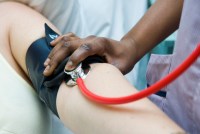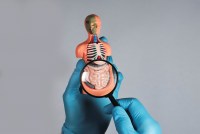Latest KFF Health News Stories
California’s Massive Medicaid Program Works for Some, but Fails Many Others
Medi-Cal serves more than one-third of the state’s population — offering a dizzying range of care to a diverse population. In the new “Faces of Medi-Cal” series, California Healthline will assess the program’s strengths and weaknesses through the lives and experiences of its enrollees.
¿Comprando seguro de salud de ACA? Aquí, lo nuevo de este año
Comprar ahora significa tener cobertura vigente a partir del 1o de enero de 2023. Aunque gran parte de los planes permanecen iguales año tras año , hay algunos cambios que los consumidores deben tener en cuenta.
Shopping for ACA Health Insurance? Here’s What’s New This Year
Consumers may find relief in some key changes made by Congress and the Biden administration, although other issues remain unsettled.
Journalists Dig In on the Fiscal Health of the Nation and Hospital Closures in Rural Missouri
KHN and California Healthline staff made the rounds on national and local media this week to discuss their stories. Here’s a collection of their appearances.
La última década ha sido testigo de una rápida expansión de las pruebas genéticas. Pero, ¿cuál es su real relevancia clínica?
Genetic Tests Create Treatment Opportunities and Confusion for Breast Cancer Patients
Doctors are divided on whether blanket testing of breast cancer patients is warranted, since scientists and physicians are sometimes unsure about how to interpret the results.
Court Ruling May Spur Competitive Health Plans to Bring Back Copays for Preventive Services
The Affordable Care Act required that health insurers provide many medical screenings and prevention services at no out-of-pocket cost to health plan members. But insurers and employers may consider adding cost sharing for preventive services now that a federal court ruled the ACA’s mandate is unconstitutional.
Many Preventive Medical Services Cost Patients Nothing. Will a Texas Court Decision Change That?
A federal judge in Texas issued a decision this week that affects the Affordable Care Act. It says one way that preventive services are selected for no-cost coverage is unconstitutional.
KHN’s ‘What the Health?’: Judge Takes Aim at the Affordable Care Act’s Preventive Care Benefits
A federal judge in Texas — the same one who tried to strike down the Affordable Care Act as unconstitutional in 2018 — has ruled against some of the ACA’s preventive benefits, including the requirement that employers cover medication to prevent HIV. Meanwhile, the U.S. Department of Veterans Affairs tries to make abortions slightly more available to veterans and their dependents. Alice Miranda Ollstein of Politico, Sarah Karlin-Smith of the Pink Sheet, and Joanne Kenen of the Johns Hopkins Bloomberg School of Public Health and Politico join KHN’s Julie Rovner to discuss these issues and more. Also this week, Rovner interviews KHN’s Lauren Sausser, who reported and wrote the latest KHN-NPR “Bill of the Month” installment.
‘Free’ Screening? Know Your Rights to Get No-Cost Care
Even a decade in, the Affordable Care Act’s recommendations to simply cover preventive screening and care without cost sharing remain confusing and complex.
Preventive Care May Be Free, but Follow-Up Diagnostic Tests Can Bring Big Bills
Under the Affordable Care Act, insurers cannot charge consumers for various preventive services that have been recommended by experts. But if those screenings indicate more testing is needed to determine whether something is wrong, patients may be on the hook for hundreds or even thousands of dollars for diagnostic services.
Her First Colonoscopy Cost Her $0. Her Second Cost $2,185. Why?
Preventive care, like screening colonoscopies, is supposed to be free of charge to patients under the Affordable Care Act. But some hospitals haven’t gotten the memo.
Betting on ‘Golden Age’ of Colonoscopies, Private Equity Invests in Gastro Docs
An aging population in need of regular cancer screenings has driven private equity companies, seeking profits, to invest in many gastroenterology practices and set up aggressive billing practices. Steep prices on routine tests are one consequence for patients.
KHN’s ‘What the Health?’: More Covid Complications for Congress
Congress is back in session, but covid diagnoses for Vice President Kamala Harris and two Democratic senators have temporarily left the Senate without a working majority to approve continued covid funding. Meanwhile, opponents of the Affordable Care Act have filed yet another lawsuit challenging a portion of the law, and we say goodbye to the late Sen. Orrin Hatch of Utah, who left a long legacy of health laws. Rachel Cohrs of STAT News, Anna Edney of Bloomberg News, and Rebecca Adams of KHN join KHN’s Julie Rovner to discuss these issues and more.
‘Incredibly Concerning’ Lawsuit Threatens No-Charge Preventive Care for Millions
A Texas federal judge, who previously ruled the Affordable Care Act unconstitutional, has signaled his openness to ending the law’s popular coverage requirement for preventive services.
Pruebas para el VPH y el cáncer cervical podrían hacerse en casa
El Instituto Nacional del Cáncer lanzará un estudio que involucrará a unas 5,000 mujeres para evaluar si la autoprueba casera puede equivaler a la que realiza el médico en un consultorio.
NIH Spearheads Study To Test At-Home Screening For HPV And Cervical Cancer
The National Cancer Institute plans to launch a multisite study next year involving roughly 5,000 women to assess whether self-sampling at home for the human papillomavirus that causes cervical cancer is comparable to screening in a doctor’s office.
Monstruoso marketing de millones de dólares impulsa el uso de mamografías 3D
La investigación de KHN muestra que el dinero de la industria ha delineado políticas, a la opinión pública y a la atención al paciente en torno a las pruebas 3D.
A Million-Dollar Marketing Juggernaut Pushes 3D Mammograms
Companies are aggressively touting 3D mammograms, although there’s no evidence they save lives.
Costos adicionales bloquean el tratamiento para prevenir el VIH
Aunque muchas aseguradoras cubren PrEP, los costos por las pruebas adicionales que hay que realizarse pueden bloquear el acceso a esta terapia preventiva.





















